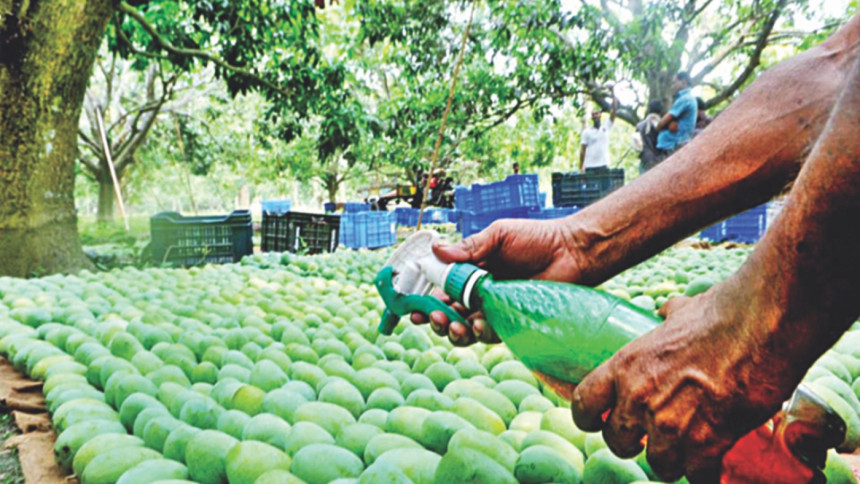Formalin control a few steps of strategies ahead

Use of formalin, though we may have lost our concern about it, is not reduced in the seasonal fruits. Buying any seasonal fruit, like lychee and mango, will reveal the truth before you. It is not surprising that apples kept openly in your house may not be rotten even for several weeks.
There are talks available in the newspapers, TV talk shows and in social media. Most of the talks are prone to regard the increase of punishment, in a more severe form, a panacea for all such crimes. Even the Government's concern in addressing the issue had given the birth of new laws with harsh punishments. However, a cautious study about the food safety law in particular, jurisprudence in general, will lead a reasonable and understanding mind to believe that making laws more strict and increasing punishments i.e. reforming the laws or enacting new laws are not enough in making the violators obey the law.
We think that the use of formalin and other harmful chemicals in seasonal fruits can effectively be stopped through application of some regulatory techniques; first of all, if we think that the severe punishment can prevent crime then the use of formalin would have been stopped long before the problem is seriously felt. The Pure Food Ordinance of 1959 (recently repealed) had prohibited the use of formalin (section 6A) with the punishment of maximum three years imprisonment, a fine upto taka 2 lac and even shutting down the concerned Business institute (section 58). But the Act was not a successful instrument to control the use of formalin for too many years until its death in recent years.
In 2013 the government has made another law namely the Safe Food Act. Section 23 of the Act prohibits the use in foods, preservation and sell of formalin and other chemicals which are injurious to health. Violators of this provision are to be punished with imprisonment of five years and with fine of twenty lac taka. But it is not proper time to say that how much the law is being implemented. Beginning of 2015 the Formalin Control Act was enacted. Section 22 of this Act prescribes the punishment of two years imprisonment or a fine of taka four lac for the use of formalin. The Pure Food Ordinance 1959, an Act prior to the Consumer Rights Protection Act, prohibited the use of formalin in food (section 6A). Moreover, the Consumer Rights Protection Act of 2009 has prohibited the use of materials in foods which is seriously harmful for the human body (section 2(20)c). Sale of any food in which such chemical were used is regarded as a violation of the consumer right. The Act provides several administrative cum quasi judicial mechanisms for addressing this type anti-consumer right activity e.g. under section 27(3) to read with section 70 the National Consumer Rights Protection Department of the Government can impose fine against the person, shop, business institutes violating this law, they can cancel the license and shut down the business permanently or temporarily.

But how much is the law implemented? Though the officers of the Department sometimes take action against the violators through setting up mobile courts and impose punishments upon them but the general consumers do not notice any regular activity of the Department. Besides there is provision for punishment of maximum three years of imprisonment or a fine of taka two lac for using any harmful materials in the food stuff (section 42).
The unfortunate situation is that no food seller has yet been punished in any finally decided case under this Act. So it is crystal clear that though there are three different laws addressing the issue of formalin the use of formalin is not controlled in fact.
Do we actually need three different laws on the same issue? Even if it is taken to be okay then how the consistency is maintained between the implementation agencies under these laws? A practical investigation into the markets answers both the questions in negative. Neither is it necessary to have three laws on the same issue and nor is there any coordination among the implementing bodies under these laws. Consequently the culprits using the formalin in food are thinking that it is not a matter that how many laws are there or how harsh the punishment is, the law is not going to be implemented.
A comparative study will show that in the countries where the consumer rights are more protected in practice give emphasise on the implementation of the laws rather than on the increase of punishment or making new laws.
However the issue of reform of the law will be left as we are giving space to the discussion of some adds on strategies which will help us to effectively control the use of formalin in food within the existing legal framework. Firstly, there is no culture of appreciation of those food sellers who abstain from such crime. Consequently after complying with the law for few days they lose inspiration and involve in the crime of food poisoning. So it is necessary to identify the sellers those who do not use formalin and inspire them through the media. The publication of the list of those sellers will help the consumers in getting pure food and the sellers being appreciated as well.
Secondly, there should be regular meeting among the implementing bodies under different laws to maintain the coordination among them. Proper coordination between different bodies will help us to control the use of formalin in an speedy and effective manner.
Moreover, research shows that the laws in addressing the food safety be more effective in increasing civil penalty or fine of a large amount of money than in increasing the term of imprisonment. Even the replacement of the form of punishment may thought about. We can say that the present legislations are more or less reflect this line of jurisprudential thinking.
However, our failure to control the use of harmful chemical in food will lead us to a dangerous consequence but let us hope for a healthy life which, in this respect, is a few steps of strategies ahead.
The writers are respectively Assistant Professor and Lecturer of Law, University of Asia Pacific.


 For all latest news, follow The Daily Star's Google News channel.
For all latest news, follow The Daily Star's Google News channel. 



Comments